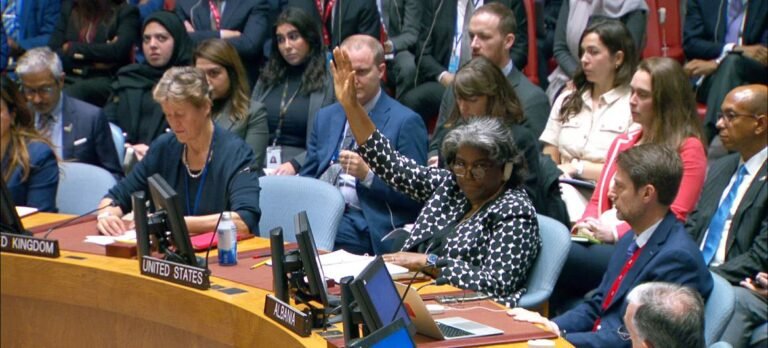By Cecilia Ologunagba
The United States on Wednesday vetoed a UN Security Council resolution that would have called for “humanitarian pauses” to deliver lifesaving aid to millions in Gaza.
The failure by the Council to make its first public intervention on the Israel-Gaza crisis followed the rejection of a Russian-backed draft on Monday evening.
While 12 of the Council’s 15 members voted in favour of the Brazilian-led text, one (United States) voted against, and two (Russia, and the United Kingdom) abstained.
A ‘no’ vote from any one of the five permanent members of the Council stops action on any measure put before it. The body’s permanent members are: China, France, Russian Federation, the United Kingdom, and the United States.
Prior to the vote, two amendments proposed by Russia, calling for an immediate, durable and full ceasefire, and to stop attacks against civilians were rejected by the Security Council.
Russian Ambassador Vassily Nebenzia said, “the time for diplomatic metaphors is long gone.”
According to him, anyone who did not support Russia’s draft resolution on this issue bears responsibility for what happens, saying, the current draft “has no clear call for a ceasefire and will not help to stop the bloodshed.”
He said Russia’s amendments proposed a call to end indiscriminate attacks on civilians and infrastructure in Gaza and the condemnation of the imposition of the blockade on the enclave; and adding a new point for a call for a humanitarian ceasefire.
“If these are not included in the current draft, it would not help to address the human situation in Gaza and polarise positions of the international community,” he said.
US Ambassador Linda Thomas-Greenfield explained her country’s veto in the Council chamber saying, “this resolution did not mention Israel’s right of self-defence.
“Israel has the inherent sight of self-defence as reflected in Article 51 of the UN Charter.”
She noted that the right was reaffirmed by the Council in previous resolutions on terrorist attacks, “this resolution should have done the same.”
She said though the U.S. could not support the resolution, it would continue to work closely with all Council members on the crisis, “just as we will continue to reiterate the need to protect civilians, including members of the media, humanitarian workers and UN officials.”
Thomas-Greenfield also noted that the U.S. is also engaged in on the ground diplomacy, with the visit of President Joseph Biden and other senior officials.
“Yes, resolutions are important, and yes, this Council must speak out. But the actions we take, must be informed by the facts on the ground and support direct diplomacy that can save lives,” she said.
Ambassador Sérgio França Danese of Brazil said his country, as President of the Security Council for October, responded to a call by Council members to forge a united response to the crisis.
“We heeded the call with a sense of urgency and responsibility, in our view the Security Council had to take action and do so very quickly.
“Council paralysis in the face of a humanitarian catastrophe is not in the interest of the international community,” he said, noting efforts to build a unified position.
Ambassador Danese reiterated that the focus was and remained on the critical humanitarian situation on the ground, guided by political realism, “but our sight was always set on the humanitarian imperative.”
He regretted that collective action had stalled, stating “very sadly, the Council was yet again unable to adopt a resolution on the crisis, again silence and inaction prevailed.”
UK Ambassador Barbara Woodward said her country abstained from the resolution as the text needed to be clearer on Israel’s inherent right to self-defence, and because it ignored the fact that extremist group Hamas, which controlled Gaza, was using Palestinian civilians as human shields.
“They (Hamas) have embedded themselves in civilian communities and made the Palestinian people their victims too,” she said.
She reiterated the UK’s support for Israel’s right to defend itself against Hamas, rescue hostages and strengthen its security in the long term, while calling on Israel “to take all feasible precautions” to avoid harming Palestinian civilians.
She added that it would continue working with all partners to alleviate the humanitarian crisis, ensure protection of civilians and “to work towards the peace and stability promised by the two-State solution.”
Lana Zaki Nusseibeh, Ambassador for the United Arab Emirates and the sole Arab nation serving on the Council, said her country voted for the resolution, not because it was a perfect text but because it clearly stated the basic principles that must be upheld.
“It is perhaps beyond me to put into words the abject horrors we are witnessing in Gaza,” she said, noting the mounting death toll, including the strike on the al-Ahli Arab Hospital.
“Each passing hour of this ruinous war makes a mockery of the principles of international humanitarian law. Gaza is laid to waste, and nobody feels safe,” she said.
She reiterated her country’s support for “no less than a full humanitarian ceasefire,” not at the expense of Israel’s security, but to allow people to tend to their wounded, bury their dead in dignity and begin putting their lives back together.
The action on the Brazilian-led draft resolution followed the defeat on Monday evening of a Russian-led text calling for a humanitarian ceasefire in Gaza which did not include any mention or condemnation of extremist group Hamas, which controlled the Gaza strip.
That resolution received five votes in favour (China, Gabon, Mozambique, Russia, and the United Arab Emirates) and four against (France, Japan, UK, and the U.S.), with six abstentions (Albania, Brazil, Ecuador, Ghana, Malta, and Switzerland).
This was the Council’s second open meeting on the situation in Gaza.
Ambassadors had met, mainly behind closed doors, on the crisis, including meetings on Oct. 8 and 13.
(NAN)
